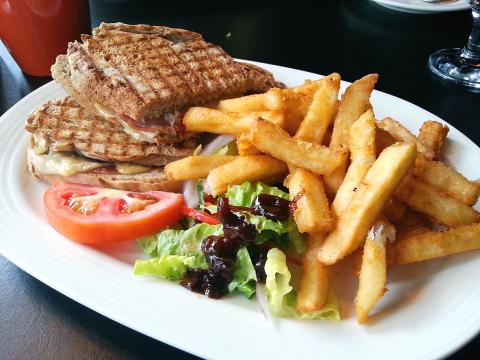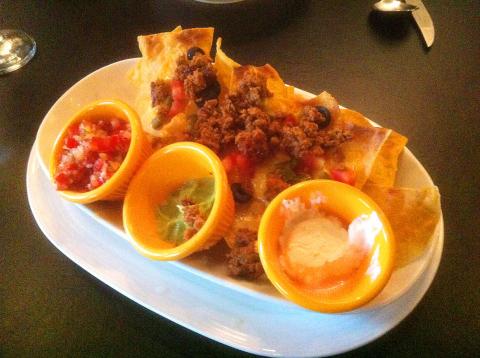You would be forgiven for thinking the menu at Toast Bar and Bistro was a clone of the menu at Carnegie’s, the popular expat restaurant and nightclub in Taipei.
Toast is run by two former Carnegie’s employees, Jonathan Wy (黃萬里) and Richard Uy (黃全利). Wy, the manager, and Uy, the chef, are Filipino-Chinese expats who helped create Carnegie’s current menu when they started working there during the late 1990s. In the meantime, they moved on to manage several different Western establishments in the city, and recently jumped on the opportunity to start their own venture. The restaurant and bar, which sports a modern, homey decor, opened six weeks ago.
If you’ve been disappointed at the quality and consistency of the food at Carnegie’s in recent times, as I have, it might be time to re-visit the source of that restaurant’s former glory. The meals on several recent visits to Toast have been very good, particularly the brunch and breakfast selections.

Photo: David Chen, taipei times
The eggs benedict (NT$230) is a fail-safe choice thanks to a brilliant twist: The restaurant uses prosicutto ham instead of plain ham or bacon. And it’s nice to see that even small side dishes aren’t neglected — the meal comes with a small salad consisting of fresh greens topped with a sweet and sour chutney, as well as a side of deep-fried potatoes, which the menu calls “Potato O’ Brien.” Never mind they’re not the real thing — chunks of potato pan-fried with green peppers and onion — these thin, coin-sized crinkle cut slices are still tasty and round out the meal nicely.
Other selections at Toast include familiar hangover-helper sets from two sides of the pond. The American breakfast (NT$320) comes with sausage, bacon, hash browns and two eggs made to order, while the English Breakfast (NT$320) adds baked beans, pan-fried tomatoes and mushrooms, and replaces the hash browns with crinkly-cut fried potatoes.
We liked the “Build Your Own Omelette” (NT$220), which diners can customize to their liking by choosing from a variety of meats, vegetables and cheeses to add as filling. The eggs are organic and they’re cooked properly — a refreshing change from the greasy mess served by Carnegie’s and many of the trendy brunch places around Taipei. The toast on the side was delicious. The restaurant makes all of its bread from scratch, which includes whole wheat and rye bread for sandwiches, dinner rolls and the dough for its stone-oven baked pizzas.

Photo: David Chen, taipei times
Wy and Uy originally envisioned opening a “gastropub,” a fancy version of a British-style pub serving gourmet food. They toned down that ambition a bit as Toast’s menu items aren’t particularly fancy or exotic, but it’s clear that much attention and care is given to preparing the food. The simple but delicious panini (NT$260) is a fine example. It’s easy to imagine this item, loaded with prosciutto (happily, again) and melted gouda cheese to the tasty bread and served with a side of French Fries and salad, becoming a favorite among regulars.
Wy and Uy naturally want customers to make repeated trips to Toast, and often, which explains the almost dizzying variety of more than 60 items on the menu. Carnegie’s regulars will notice their favorites — a long list of bar food staples, Mexican and pasta, but there is a fair number of new items recommended by the house, including Mexican fajitas (NT$280), Lamb Rogan Josh curry (NT$350), Belgian Mussels with Frites (NT$320) and a variety of 10-inch pizzas (NT$260 to NT$280).
The restaurant plans to launch weekly specials, with off-menu items such as Shepherd’s pie, Chicken Briyani and tacos, and offers happy hour specials on mixed drinks for NT$90 from 5pm to 8pm every day.
The comfy two-story space will also win repeat customers. Wooden floors and an interior design that mixes art deco and modern elements contribute to the Toast’s classy but casual atmosphere.
Wy, who often greets customers as they enter, sets the bar high for attentive and friendly service. In general his wait staff do a good job, though a few of the new waiters need to do some catching up.
But all in all, Toast is off to a good start — the only question, as with any new venture, is whether Wy and Uy can keep up the quality and maintain a steady clientele. Their ample experience in the business and the good and reasonably-priced food suggests they will.

Dissident artist Ai Weiwei’s (艾未未) famous return to the People’s Republic of China (PRC) has been overshadowed by the astonishing news of the latest arrests of senior military figures for “corruption,” but it is an interesting piece of news in its own right, though more for what Ai does not understand than for what he does. Ai simply lacks the reflective understanding that the loneliness and isolation he imagines are “European” are simply the joys of life as an expat. That goes both ways: “I love Taiwan!” say many still wet-behind-the-ears expats here, not realizing what they love is being an

Every now and then, even hardcore hikers like to sleep in, leave the heavy gear at home and just enjoy a relaxed half-day stroll in the mountains: no cold, no steep uphills, no pressure to walk a certain distance in a day. In the winter, the mild climate and lower elevations of the forests in Taiwan’s far south offer a number of easy escapes like this. A prime example is the river above Mudan Reservoir (牡丹水庫): with shallow water, gentle current, abundant wildlife and a complete lack of tourists, this walk is accessible to nearly everyone but still feels quite remote.

It’s a bold filmmaking choice to have a countdown clock on the screen for most of your movie. In the best-case scenario for a movie like Mercy, in which a Los Angeles detective has to prove his innocence to an artificial intelligence judge within said time limit, it heightens the tension. Who hasn’t gotten sweaty palms in, say, a Mission: Impossible movie when the bomb is ticking down and Tom Cruise still hasn’t cleared the building? Why not just extend it for the duration? Perhaps in a better movie it might have worked. Sadly in Mercy, it’s an ever-present reminder of just

Google unveiled an artificial intelligence tool Wednesday that its scientists said would help unravel the mysteries of the human genome — and could one day lead to new treatments for diseases. The deep learning model AlphaGenome was hailed by outside researchers as a “breakthrough” that would let scientists study and even simulate the roots of difficult-to-treat genetic diseases. While the first complete map of the human genome in 2003 “gave us the book of life, reading it remained a challenge,” Pushmeet Kohli, vice president of research at Google DeepMind, told journalists. “We have the text,” he said, which is a sequence of